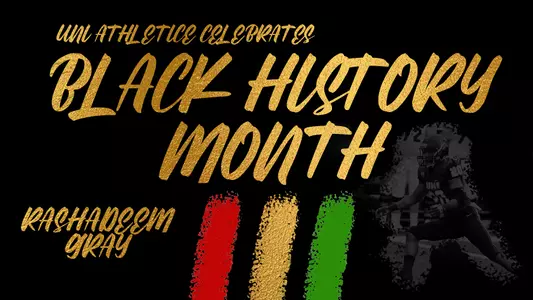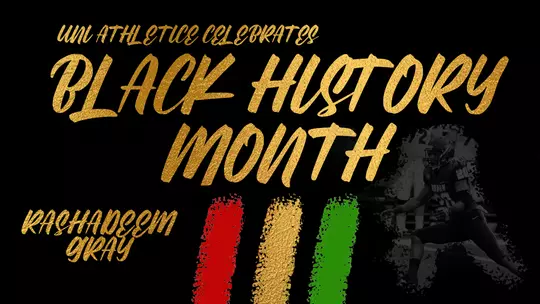University of Northern Iowa Athletics

UNI Celebrates Black History Month - Rashadeem Gray
2/4/2021 12:00:00 PM | Football

Former UNI football player Rashadeem Gray had a successful tenure during his time on campus, but his success post-graduation is perhaps much more important and impactful than any particular football game or accolade he could have earned while playing for the Panthers.
A native of Wisconsin, Gray played for the Panthers from 2014-17 as a defensive back for the Panthers. His early life was difficult, to say the least.
“I grew up in Milwaukee, not in the best neighborhood,” He said. “I struggled a bit in the beginning, first being at a Spanish merger school where most of the curriculum was in Spanish. Around middle school, my grandmother moved to an area called Whitefish Bay which had a regular English curriculum. I definitely struggled moving from a school with mostly Black and Hispanic students to a school with mostly White students.”
Transitioning to high school was perhaps an even greater challenge for Gray. He didn’t initially play football and had struggles with behavioral issues before settling into a niche with athletics.
“I actually didn’t play football before high school, and I was pretty bad at it,” Gray said. “When I got to high school, I struggled with behavioral issues. I attribute it to not knowing the material in class and I acted out. I got sent home several times in middle school and high school. I didn’t realize how important school was in relation to playing sports and I really didn’t have anyone telling me that it was important to focus on the classroom. Eventually, one of my buddies suggested that I get help with school after I failed my third test in a row. I was ineligible to play football my sophomore year because of this.”
On top of his academic struggles, Gray experienced turmoil at home.
“My older brother got into some trouble with the law during the spring of my freshman year, which made it difficult for me. A lot of times we would get pulled over by the police, and not just one squad car but multiple ones, and not for doing anything wrong, but because my brother was a suspect. It impacted me down the road in high school. It was difficult to go to school and deal with everything going on at home. I kind of was living in a bag for a while, going between my mom’s house, aunt’s house and grandma’s house.”
It was difficult to go to school and deal with everything going on at home. I kind of was living in a bag for a while, going between my mom’s house, aunt’s house and grandma’s house.
Gray’s struggles in his early life led to an interest in teaching and coaching, sort of as a way to mentor younger students. Upon graduating from UNI in 2017, he student taught in Colorado and earned his first teaching job down in Texas. His experience as a Black man in contemporary society also sparked a passion for promoting a social media campaign titled “My Black Future'' around his school district of White Fish Bay (his alma mater) and community.
“I was roaming the halls during my off period one day when the principal of my school asked me if I was certified to teach Black history. I told her I was and she asked me to write a curriculum, and I took the opportunity. Not just as an opportunity for myself, but for my students. I had never heard of a high school, or college for that matter, offering a Black history class. I had never had a Black history class, so I thought it would be exciting to teach one and take one at the same time. Initially, the curriculum was a struggle, because I had taught from the Transatlantic slave trade up until the Reconstruction period. Then, I taught Reconstruction to the present day, so kids were getting two different curriculums for the same class.”
“We were able to do an awareness assembly that featured some of the overt prejudice and racism that some of us have experienced growing up in a predominantly white school, and it also featured a mental health talk and Gay-Straight Alliance (GSA) speaking at the assembly.” The assemblies are meant as a chance for minority student organizations and other groups to be vocal and show the rest of the students at the school what they stand for.
Gray also cites lack of representation for his reasoning for wanting to get into teaching.
“I would say the lack of representation for people who look like me was a motivator,” he said. “I have never had a Black teacher, male or female. I think it’s important to have people teaching you who look like you, because there’s a certain level of disconnect otherwise. I think I would have my head on straight sooner if I had a Black teacher say something to me. When I taught in Texas, the principal was Black and there were many Black teachers. All of the successful Black people I had seen through my senior year were either athletes or drug dealers. We would have conversations of ‘who is most likely to be the next drug dealer’ or ‘which sports team am I going to play for,’ and no talk about becoming a doctor, lawyer or teacher.”
Gray has been making a positive impact on the students of his school. Using his past experiences and rough upbringing, along with a desire to have more Black representation in the classroom has led to hundreds of students in his school signing up to take his Black history classes. He hopes that his message that his cause will only continue to be furthered into the future and to other school districts around the country.




